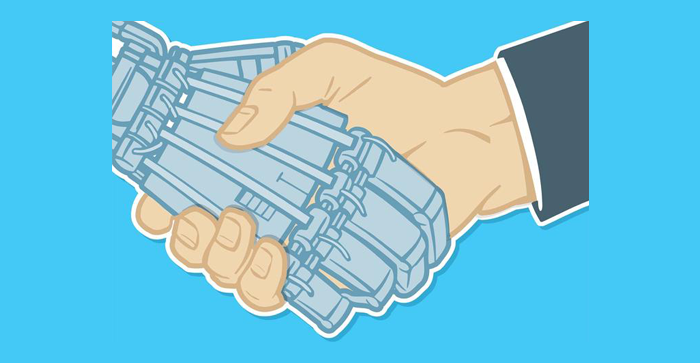Why Hard Work is for Machines and Not Humans?
by Anna Kane , 6 years ago

Since the day that machines were invented to take on repetitive tasks, people have felt a growing fear that machines will one day make humans jobless. In today’s world, automated machines have taken over 1 percent of the total available labour globally. But despite the fears and the impending dangers this trend might bring, it might just be what the future generation needs.
The Threat of Full Automation
The obvious threat that automatic machines pose is an impending labour crisis. With more machines replacing human labour especially in perilous tasks, humans may eventually find themselves eventually unemployed. With a global unemployment rate of 5.8 percent in 2017, according to the International Labour Organization (ILO), labour automation may not sound attractive for workers globally.
If you think about it, the whole point of inventing robotic machines is precisely to replace humans. Before the spinning jenny was invented in 1764, wages were at an all-time high in Europe. This meant gold for mill owners – to purchase a machine that could produce more than what workers could normally produce and with less money to spare for maintenance.
In a book written by Joel Mokyr, Chris Vickers, and Nicolas L. Ziebarth titled The History of Technological Anxiety and the Future of Economic Growth: Is this Time Different?, the authors pointed out how it didn’t matter if people were right or wrong about machines taking over humans in the economic sphere. What mattered, instead, was how we responded in terms of mitigating the costs of unemployment among other effects automation might harbour.
Mokyr, Vickers and Ziebarth most eloquently states this problem by saying: “While the predictions of widespread technological unemployment were, by and large, wrong, we should not trivialize the costs borne by the many who were actually displaced.”
The authors wanted to bring people’s attention to swathes of workers who were rendered jobless at the advent of machines. They also sought to elaborate on how technological advancements are remolding the economy to fit its needs.
But looking at the big picture, robots taking over humans especially among hazardous jobs could lift countries still struggling from economic crises.
Why Robots are the Future
Like humans, robots have evolved in recent years since they were first used in the workplace. Recent upgrades and enhancements now allow machines to outpace entire teams and departments compose of manual labourers. Take for instance, a gourmet robot developed by Momentum Machines that can cook a delicious hamburger in just 10 seconds. Imagine that kind of machine replacing workers in an entire restaurant or fast food chain.
Indeed, the levels of sophistication embedded in machines today are becoming more and more intelligent, and closer to how humans think. Even the familiar Siri from your iPhone can understand what you want her to do and can even remind you of your schedule for the day.
Martin Ford, in his book Rise of the Robots, thinks that robots are indeed the future of mankind. Interestingly, a number of luminaries and researchers are siding with Ford in his thesis. According to a study conducted by researchers from Oxford University, 47 percent of jobs in the United States will most likely be taken over by machines in just two decades.
Ford proposes that in the future, the world may face the worst labour crisis there is, naturally begetting a full-pledged revolt led by the workers that were left jobless by machines. On the optimistic side, he hypothesizes that a new economic order will be established that will allow people to live up to their full human potential without the need to go to work. Yes, you read that right – no work. Some people believe that full robotic automation of labour can solve the deepening divide between the rich and the poor as people can, in the future, receive money earned by machines.
How Machines Have Benefitted Our Industries
While there’s still a great debate going on among scientists and economists about this theory, there are also alternative ideas that might just ring true and are based on history. In the early 1800s, a majority of the earth’s population was involved in agricultural work. But with the age of mechanization, less and less people got engaged in farming. It is important to note here that mechanization never destroyed the agricultural industry. In fact, machines made it better.
With the rise of agricultural machines, food is now a lot cheaper than how it was a couple of hundred years ago. Technological developments also allowed greater efficiency in harvesting, higher yielding crops and plans – advancements that could feed the world and save it from widespread famine.
Robots are designed to produce 100% efficiency better than what manual labour could possibly render. A great deal of occupational hazards and accidents occur in jobs that can easily be done by machines with a guarantee of zero human casualty. Consider space research and exploration where machines most likely excel. The hazards of outer space, the lack of oxygen and deadly radioactive waves make machines the perfect candidates to get the job done in space.
In addition to greater efficiency, machines are also 100% more accurate than humans. Automated machines are increasingly being used in financial institutions to count money in mere seconds as opposed to human tellers that can take days counting cash flows manually. This is true most especially in the banking industry wherein a single human error can mean billions of dollars lost.
Unlike human beings, machines don’t need to rest. Operating 24 hours a day compared to workers who can only work for 8 hours implies thrice the productivity compared to manual labour. Automated machine’s propensity to yield higher profits is a sure reason businessmen and industrialists are starting to purchase automated machines to do what workers used to do.
Two centuries ago, 80 percent of Americans worked in the farming industry. But today, only 2 percent of Americans are involved in farming. The 72 percent continued working in other fields as more jobs emerged from an increasingly automated world. Some say this might be the answer we’re looking for: that automation will not simply replace humans. Rather, more machines created may mean more jobs for the peoples of the world.
Register and post a comment
You may also be interested in

PHP on steroids? Swoole introduction and benchmarks
What is Swoole? Swoole is an open-source C extension for PHP that enables true event-driven, async programming for PHP via its coroutines implement...
Top self hosted ecommerce platforms in 2020
The self-host eCommerce platform- a potentially cheaper, but definitely more customizable, more flexible, and more transparent solution if you’re look...
Ben Stokes
thanks alot i was looking or this
Ben Stokes
That’s a really interesting perspective on automation and how it shapes daily life. Speaking of changes, even restaurants like Texas Roadhouse have adapted by making things more convenient for customers. They now accept Apple Pay at many locations, which makes paying quicker and easier without fumbling for cash or cards. It’s a small example, but it shows how tech can improve the experience instead of replacing it.